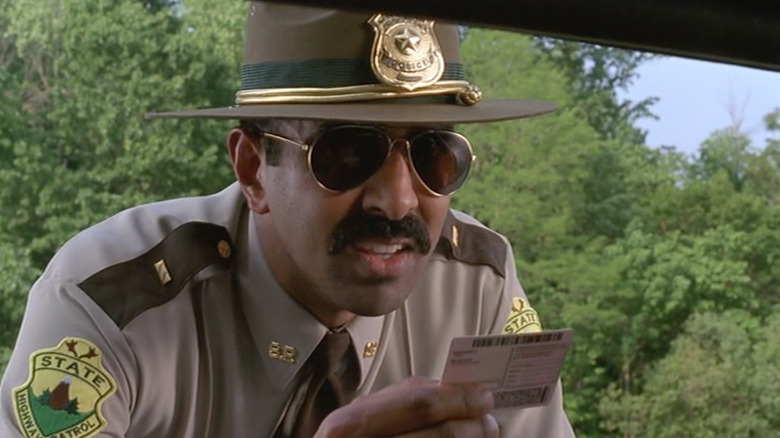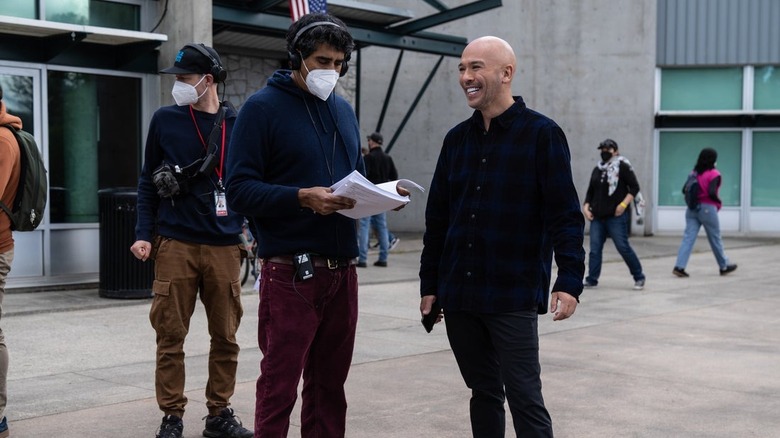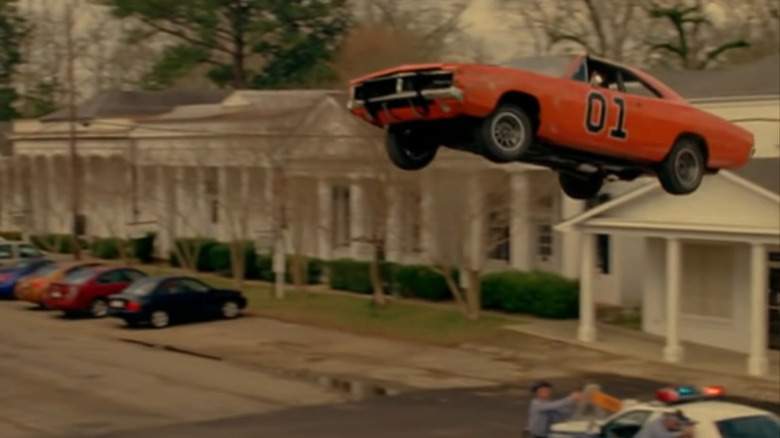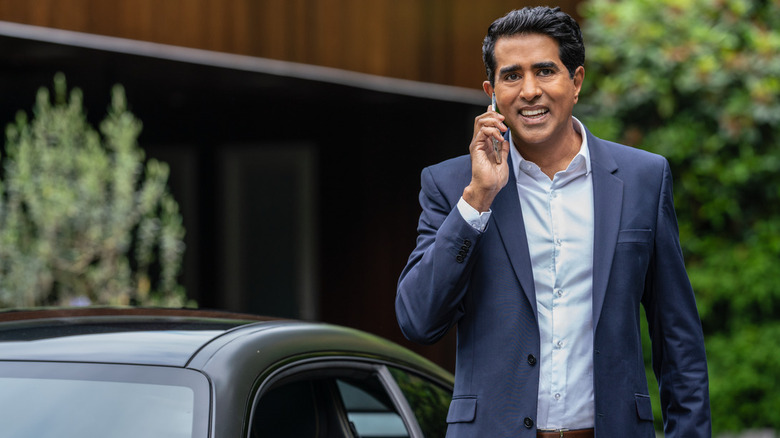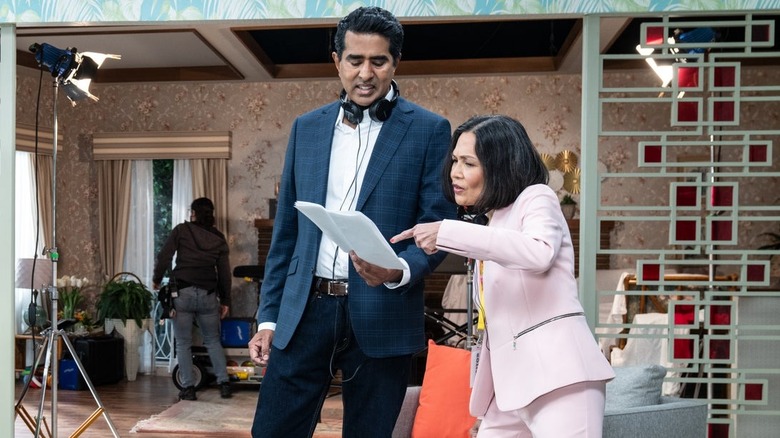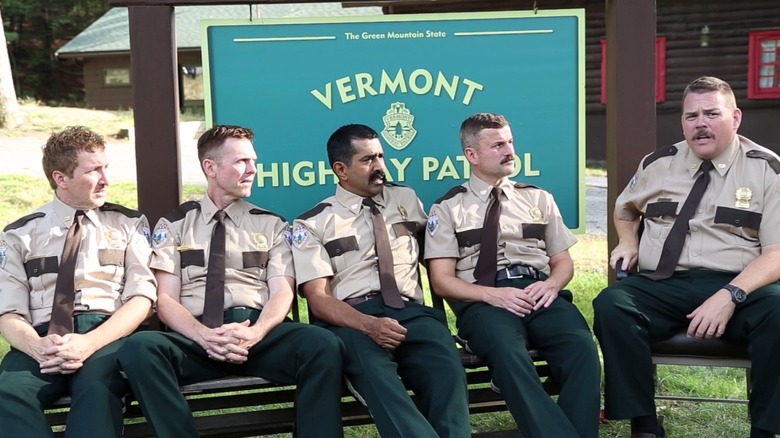Easter Sunday Director Jay Chandrasekhar Convinced Universal To Keep The Movie In Theaters [Interview]
After reading that headline and seeing that header image, you might be saying to yourself, "Hold on meow." No, your eyes do not deceive you. You probably know Jay Chandrasekhar as one of the stars from the fan-favorite comedies "Super Troopers" and "Beerfest" as a member of the comedy troupe Broken Lizard. However, he has quite a storied career behind the camera as well. In addition to writing and directing those films, Chandrasekhar has directed episodes of some of the most beloved comedies on television, including "Chuck," "Happy Endings," "New Girl," "Fresh Off The Boat," and "The Goldbergs."
Meow, the filmmaker is returning to theaters this summer by helming comedian Jo Koy's first movie, "Easter Sunday." Ahead of the film's premiere in theaters, we had the chance to talk to Chandrasekhar about meow he chooses his projects, the progress of diversity in Hollywood, and the many challenges this movie faced, like putting a first-time actor in the spotlight and fighting for a theatrical release. Plus, he gets into his experience of wearing both his director and actor hats in a movie and the latest film from Broken Lizard.
Read on, meow.
'I love Jo Koy and I believe he's got great charisma'
Behind the camera, your resume is filled with some of the best TV comedies from the 2000s to now. And of course there's everything you've done with Broken Lizard. How do you go about selecting which projects you'll take on as a director?
The film side of it is much more crafted and specific. If you make a movie, you have to meet the press and talk about it and explain your reasons and why you thought it was going to work. If you're in television, there's somebody else who's meeting the press and you're just there to sort of make a great version of their show. And so I was lucky enough to be involved in the early "Arrested Development" [episodes]. And by that, I mean, episode 4. That kind of early. And so I was able to get involved and we kind of have creative conversations about what we could do to make the show even a little bit better than it was already starting out. But at the end of the day, when I walk away and I make an episode, nobody's looking for me to explain why I did "Arrested Development" or "Community" or any of that.
But the film business, it's like all a big sort of theory, right? Like, I believe a movie about the Highway Patrol is going to work, and then you raise the money and then you make it. And then when it works, you go, "See? I was right." That's the same thing with this one. They're like, "Do you want to make a film with Jo Koy?" And I said, "Well, yeah. Can he act?" And they said, "Well, we don't know yet. This is his first movie." I love Jo Koy and I believe he's got great charisma. And so I believe if you take his big audience and I can go up there and make sure that he comes off well in the movie, I believe this will work. And it turns out he can act! If he couldn't, none of this would've worked.
Did you feel any pressure knowing that you were going into this with a first time actor?
The film business is all pressure. And so it doesn't feel like pressure when it's pressure all the time. It doesn't matter. Of course it's pressure.
That's true. It's just your default setting at this point.
We charge into insane scenarios and go, "Don't worry. I got it." And I said it's going to work because he's got charisma. I put him with an acting coach friend of mine and said, "This guy, do your best and get him ready for me. And then when he gets on the set, I'll become his acting coach." My friend got him really ready. And then I gave him a few pointers and a few tips. After the first day, he really just took off as an actor and was really well-prepared. I said, "The most important thing you can do is know your lines and show up on time. If you do that, we got a great script. We can make a great movie."
'I want to make funny movies with big car chases and fights'
After "Super Troopers" and "Dukes of Hazzard," you seem to be pretty at home with car-based action scenes. How was putting together the chase sequence in "Easter Sunday" different than your past experiences?
Well, "Dukes of Hazzard" had 25 second unit stunt days. We had to pull this car chase [in "Easter Sunday'] off with two second unit stunt days. So it was a lot. I mean, granted, there were 10 car chases in "Dukes of Hazzard" and there was one in this. But we had to get the weather perfect and the stunt people had to nail it the first time, which they did. And I feel very comfortable shooting car chases, so I wasn't worried about it. I just said to the guy, "You only had two days, so let's accomplish this. And what you're going to do is you're going to have the cars screeching around and driving backwards and flipping around and the writers will write good jokes for these moments. This moment after this skid, this moment after this left turn ..." We just kind of constructed it, piece by piece.
Do you think your work with car sequences qualifies you for a "Fast and Furious"-type movie in the future?
Look, the "Fast and Furious" movies are car chases, right? They don't try to crack jokes. So it's a different tone from the kind of movie that I gravitate towards. I'm looking to make a movie more like "48 Hours" or "Midnight Run." I want to make funny movies with big car chases and fights, and "The Fast and the Furious" is looking [to] make dramatic movies with car chases and fights. So while I could do a movie like that, I don't know that I'm going to be the first guy they call.
'My role in the movie is the 'move along the plot' guy'
Not only are you the director of "Easter Sunday," but you also play Joe Valencia's agent, Nick. How would you say working with Jay Chandrasekhar the actor is versus working with Jay Chandrasekhar the director?
Well, I'm so involved in writing the specifics of the jokes. I always know the lines and I try to come up with two or three extra jokes in case. I have a stand-in and I look at the camera angles and I look at the camera moves with the stand-in. And after that, you got to just sort of give over and you've got to trust that everyone's going to have it in focus. And Jo Koy directed my acting when we did these scenes. He's one of the greatest comics in the world. He and I connect very viscerally in terms of comic to comic, so when he came in and took care of the directing for my acting, I felt in very good hands.
A lot of your scenes seemed pretty secluded from the rest of the cast. Were you disappointed that you didn't get to interact with the majority of your actors in your scenes?
Well, my role in the movie is the "move along the plot" guy. I was there to tell you what's going on in L.A. now. So that's my job. And so I was happy to be [that]. We'd crack a couple of jokes at my house or in the car and I would move the plot along and then I'd pretend like I'm going into a tunnel, then I hang up. I liked that role. And then at the end, I got to be with everybody in that one scene when Joe [REDACTED]. So I got a little bit of human interaction rather than being just solo on the phone.
'Progress is one step at a time'
Leading up to Joe getting his sitcom, Nick is trying to get Joe to do this accent in order to land the job. Have you had similar calls like that from agents and executives in your own career?
I mean, it all depends. A lot of us just go in or used to go in on roles and the role required an accent. And I get it. You do the accent or you don't do the accent. If you don't want to do the accent, you don't show up to the audition. But I've never been pressured by an agent to do it because, I think in large part, they've gotten to know me and they know that I don't take pressure from other people to do anything I don't want to do. I'm not willing to go along, but we made the situation for this character difficult. He needed the money. They wanted to give him the show. They just wanted the accent.
And it's sort of the way it goes. That was the kind of role that you get in a movie in the '90s, right? You'd have an accent. And there's nothing wrong with that. That was diversity as well. The only thing that's changed is that there are a lot more children of these immigrants who speak like me. And so they're like, "Well, why?" I get why the people in the movie had accents in the '90s because these immigrants were mostly coming from other countries, but now we're the children of those people. And we speak like we speak. And theoretically, we should be able to act with our own voices. We're in this phase of the diversity movement has gotten to, but it doesn't discredit the previous phase. It's not like that was embarrassing or that was shameful. It's just where it was. Progress is one step at a time.
It's true. We've come a long way from Long Duk Dong.
Well, look, Long Duk Dong is an example of a character that everybody in the country loved and laughed their a**es off. And if you look at it now, well, it doesn't hold up to the test of time. But at the time, it probably felt pretty good to some people. It probably felt pretty good to have a really funny character in that.
Yeah, that's fair.
Now, we can't judge the past by the present. It's not fair to who we were back then. Imagine somebody in 2040 judging us now for the things we say. And well, that's not fair. We're trying to be decent people.
That's true. A lot of people are trying a lot harder these days, too, which is very appreciated. For example, this movie making it to theaters rather than streaming.
Yeah. My view is that we had a perfectly good thing going with theatrical comedies. And this comedy, by the way, is the only theatrical wide release comedy this summer.
Really?
The only one. There was a point in February where they were like, "Because of Covid, should we just put it out on Netflix? We'll be in profit right away." And I just said to them, "You've got Jo Koy, who's the number one ticket selling comic in show business. You've got a movie that works. And you've got Universal Pictures, which is the best comedy distributor in show business. Jo Koy now is like Steve Martin before 'The Jerk' or Eddie Murphy before '48 Hours' or Kevin Hart. You guys have a huge audience here." I said, "Everyone's wondering who's going to bring back the theatrical comedy. Well, stop looking — it's us! This is it! Let's roll some dice and let's put that Universal marketing machine to work and let's go for it." And luckily, they went for that.
Oh, I'm so glad they did.
They really did. They really came through for us. They've really come through and they gave it the full treatment and I'm really happy with it.
I'm Filipino American and seeing Filipino Americans onscreen like this in a major Hollywood movie is just very meaningful, because it doesn't happen every day or ever.
Well, it's never happened before.
Exactly. The closest thing interestingly enough also involved Steven Spielberg. It was "Hook," which starred Dante Basco as Rufio alongside Robin Williams' Peter Pan.
Dante Basco! I just met him two nights ago at a party.
'Believe it or not, they still allow us to be in show business'
I would be remiss if I didn't bring up Broken Lizard a little bit, since that was such a big part of your career. Do you have anything in the works with those guys right now? Maybe a guest appearance on "Tacoma FD?"
We shot a film called "Quasi," which is coming out, I think, in December through Hulu, and Kevin Heffernan directed it. It's set in 13th century France. I played the King of France and Paul Soter plays the Pope and then Steve Lemme plays the Hunchback of Notre Dame. It's a political assassination thriller comedy with British accents. It's a full-on Monty Python movie. And Kevin did a great job directing it, so I'm really pretty proud of it.
That's very cool. You and your colleagues are doing some big things all around the town right now.
Well, we went all the way from Colgate University where we met when we were 18, and, believe it or not, they still allow us to be in show business. We love it.
And your fans love it, too.
I appreciate that.
"Easter Sunday" is in theaters now.
